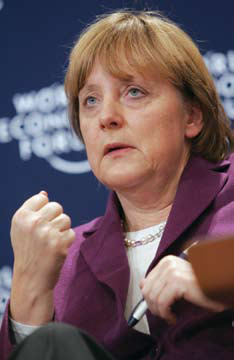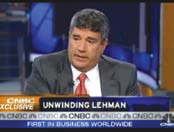EU Opens the Floodgates For Hyperinflation
By Helga Zepp-LaRouche
April 2010
|
Helga Zepp-LaRouche addresses March 20, 2010 BüSo conference in Bad Salzuflen. |
Helga Zepp-LaRouche is the founder and international chairwoman of the Schiller Institute and of the Civil Rights Solidarity Movement (BüSo), the party of the LaRouche movement in Germany, which is running a slate of candidates in the state legislative elections in North Rhine-Westphalia on May 9, 2010. This article was translated from German and footnotes were added.
This article appears in the April 9, 2010 issue of Executive Intelligence Review and is reprinted with permision.
If one were to believe most of the media and the German government's own pronouncements in the days leading up to the European Union summit on March 25-26, 2010, Chancellor Angela Merkel would suddenly have mutated from being the weak moderator of domestic politics, into the "Iron Chancellor," the "Maggie Merkel" of the international stage, who is valiantly defending the stability of the euro against all opposition from the other EU members, and making sure that the German taxpayer does not have to bear the main burden of Greece's impending bankruptcy. That things would somehow be more stable, if not only EU member-states, but also the IMF, were called upon in the emergency to rescue Greece.
Germany’s Chancellor, Angela Merkel, is trying to project an image as “Maggie Merkel,” the “Iron Chancellor.” |
But it was the monetarist-oriented daily Handelsblatt, believe it or not, that on March 25 let the cat out of the bag, with the headline: "Dam Break in the Fight Against Inflation," pointing out that the IMF's involvement in Greece just means that nothing but such a detour can get the budget holes plugged with cash, and that this would mean "the highest risk of inflation." (!) Talk of an imminent "meltdown" and the "threat of Germany's self-destruction" is making the rounds at the Bundesbank and the Federal Ministry of Finance, and this, the newspaper comments, is the reason the public has not been informed, because there are "complex monetary and technical financial options" involved, for actions which are not clearly apparent at first glance.
With a view to the coming elections in North Rhine-Westphalia, Berlin has abandoned the position it has defended for decades—that the central banks should not plug budget deficits—and, via the IMF, the central banks of several countries, including the Bundesbank, are supplying Greece with fresh euros, which is the "disguised bailout" that the EU Treaty explicitly forbids. In any case, the IMF is not a separate institution—the Eurozone countries constitute 22% of it, so it is not an "either/or" matter. And since Greece represents only the tip of the iceberg, beneath which you can find the really big chunks—Spain, Italy, and Portugal—this IMF-EU model for Greece represents only the test case.
Of even more far-reaching importance, however, is the ECB's U-turn on this question—nobody is talking any more about the previously discussed "exit strategy" from money pumping. On March 26, ECB chief Jean-Claude Trichet, speaking at the European Parliament, announced the extension of the "exception rule," introduced when the financial crisis began, which allows low collateral requirements for banks to finance their transactions. Thus, banks will now be permitted, beyond the year 2010, to offer lower-quality government bonds as collateral to borrow money from the ECB.
Until 2008, a rating agency grade of at least A-, or A3, was required as collateral for government bonds; since 2008, the ECB has also accepted government bonds with only a BBB- grade. The Spanish banks particularly benefited from this rule, since they could deposit such large amounts of toxic waste with the ECB, and have the pleasure of receiving fresh loans in return. With the current extension of the ruling, the ECB opens the door to deposits of enormous amounts of other financial paper, only one notch above junk-rating, according to the Frankfurter Allgemeine Zeitung, which writes that we are talking about commercial paper valued at about EU11 trillion, whose security then comes into question.
The Italian business daily Il Sole 24 Ore describes the volume of such securities that are turning up in the accounts of the ECB: EU200 billion in sovereign debt, non-bank guaranteed bonds worth EU500 billion, and EU750 billion in asset-backed securities. So every time the (private) rating agencies downgrade a bond, the pile of waste on which the ECB is sitting increases, and the rating agencies can also determine in this way what is still accepted as collateral, and what is not.
Both measures have an inflationary effect: the IMF's involvement in future rescue packages, and the extended acceptance of lower-grade government bonds. Behind both is the intention to leave the casino economy and high-risk gambling essentially intact. Since the medicine that the IMF and EU are prescribing for Greece—namely, the most brutal budget cuts, which threaten to kill patients, and to set off a bottomless spiral, such that further state bankruptcies will occur this year—creates an instrumentarium that can lead to hyperinflation in the relatively short term.
Bryan Marsal, CEO of the bankrupt Lehman Brothers, to Handelsblatt: “It is even likely that a case like Lehmans will repeat itself in any event, as long as nothing fundamental changes in financial regulation and in financial institutions. Wall Street has not really learned a lot from the situation. There is still too much leverage in the market, and credit default swaps remain completely unregulated. Even with regulators and in the companies, little has been done after the global catastrophe.” HB: “But financial regulators around the world are now pulling in the reins.” Marsal: “Oh, really? That’s just for show.” |
Bryan Marsal, of all people, who is CEO of the bankrupt Lehman Brothers, said, in an interview with Handelsblatt, published March 24,[1] that the next great crisis is imminent, since none of the problems that came to light in 2008 have been solved, no lessons were learned from the disaster, and the banks are doing now exactly what they were doing before.
An indication of how the euro crisis is now perceived worldwide, is shown by the fact that, for the first time, the vice governor of China's central bank, Zhu Min, questioned the stability of the euro; Greece is just the tip of the iceberg, he said; and Spain and Italy are obviously of greater concern. Zhu stressed that the deeper structural problem is how the euro will be managed: "We do not see resolute actions that signal to the markets, 'We can solve this problem, we can end this crisis.' Therefore, the markets are very unpredictable." Since China holds a significant part of its currency reserves in euros, and China, despite its relatively good growth rates, is sitting on a social and political powder keg, these concerns should not be ignored.
Exit from the Euro
The Financial Times of March 25 published an article by the four German professors, namely Professors [Wilhelm] Hankel, [Wilhelm] Nölling, [Karl Albrecht] Schachtschneider, and [Joachim] Starbatty, who filed a lawsuit against the introduction of the euro in 1993 and 1998, before the German Constitutional Court in Karlsruhe. They argue that only Greece's exit from the euro and the reintroduction of the drachma would represent a way out.[2] They also pointed to the Karlsruhe ruling of 1993, which allows Germany to remain in the euro system only if the euro maintains the same stability which the D-mark previously had; and they would announce an immediate new lawsuit in Karlsruhe, if the European governments dole out financial aid to Greece, in violation of the Maastricht Treaty's "no bailout clause." They expect to have a better chance of winning the case this time, given the massive problems of the euro.
Not only have these professors, along with the present author, been proven right, when they said back then that the European Monetary Union could not function due to the member-states' different structures: As forecast, their competitive differences have now become even stronger. The argument that "the European process," the euro, and European integration would secure peace in Europe, has turned out to be a fiction. Instead of developing into an orchestra which performs Classically composed works according to the laws of polyphonic harmony, this Europe has become a cacophony, in which prejudices, and even insults, have produced discontent and dissonance.
One thing, however, has to be set straight, with no room for misunderstanding: The mutiple accusations against Germany, that it is reaping the benefits of the euro, and that it is deliberately procuring export advantages at the expense of the other member states—not to mention the many other vile accusations—are hypocritical, and false.
The fact is, Germany is not responsible for, but rather is the victim of the faulty construction of the euro. It wasn't Helmut Kohl who wanted to tie the euro to German reunification, but rather it was Margaret Thatcher, François Mitterrand, and George Bush, Sr., whose joint intention it was to weaken Germany's economy, forcing Germany into the EU corset and into NATO—explicitly as "unity and self-constraint through integration." Since then, the construct of the Monster of Maastricht has caused Germany to emerge as the great paymaster of the EU, and under the constraints set by the EU, its export surpluses have gone more for the benefit of the large corporations oriented toward British free trade, while at the same time, Germany's domestic market, along with the purchasing power and living standards of the productive segment of our population, has dwindled.
All of us—Germany, Greece, Ireland, and so forth—are victims of a construct which has been set into place in order to serve the interests of the financial oligarchy's empire, against the people's interests. This empire's lackeys, with Thatcher, Mitterrand, and Bush in the forefront, took the lost historic opportunity of 1989, the fall of the Wall, and German reunification, and transformed the EU into a regional empire, as part of the worldwide globalization imperium.
And what has this brought us? Civilization is on the verge of a new Dark Age. Over the past four years, the number of people who go hungry each day worldwide has climbed from 800 million to 1.2 billion. The North-South dialogue, and even the mere pretense of remedying hunger in the developing countries, has ground to a complete halt. Ferry boats to many Greek islands in the Aegean are no longer operating, while in Germany's cities, public swimming pools, libraries, and day-care centers are shutting down. The debate over privatizing the health-care system is starting up again—we already had that once, 70 years ago. The United States is in the throes of a crisis far beyond most people's imagination. The list of institutions and other things that were once taken for granted, and are now breaking down, goes on and on.
Is Humanity Governable?
We must make a sudden, drastic change of course. Events in the coming period will make it crystal clear, that Germany's only chance of survival, is if we regain sovereignty over our own currency and economic policy. And that means we have to exit from the euro system, and reintroduce the deutschemark. The casino economy must be put out of business, and a Glass-Steagall standard must be enforced—i.e., a two-tier banking system—and a new credit system must be created to serve the general welfare and the real economy, and nothing else.
In an only slightly different context, a commentary in the Chinese People's Daily asked whether it must necessarily be the case, that American politicians believe they have to force China to adopt a policy which is damaging to the Chinese nation. That really begs the question, of whether humanity is governable at all. Because if China and America cannot successfully cooperate, then humanity would, in fact, become ungovernable.
And that's actually the same question whch we Europeans must now ask ourselves: Can we liberate ourselves in time, from structures which conflict with the interests of humanity and our citizens' self-interest, and which, in short order, are going to render Europe, for all intents and purposes, ungovernable?
In the immediate future in North Rhine-Westphalia, we have an opportunity to make a powerful step toward setting Germany back on the right course. Support and vote for the BüSo! North Rhine-Westphalia elections
[1] http://philsbackupsite.wordpress.com/2010/03/24/lehman-chief-warns- of-more-big-bank-failures/
[2] http://www.ft.com/cms/s/0/6a618b7a-3847-11df-8420-00144feabdc0.html
Related pages:
A Glass-Steagall for Europe: Outlaw Currency Speculation by Helga Zepp-LaRouche
Helga Zepp-LaRouche Addresses BüSo Conference March 20, 2010
Biography of Helga Zepp-LaRouche and Selected Articles
More Articles by Helga Zepp-LaRouche and Lyndon H. LaRouche, Jr.



